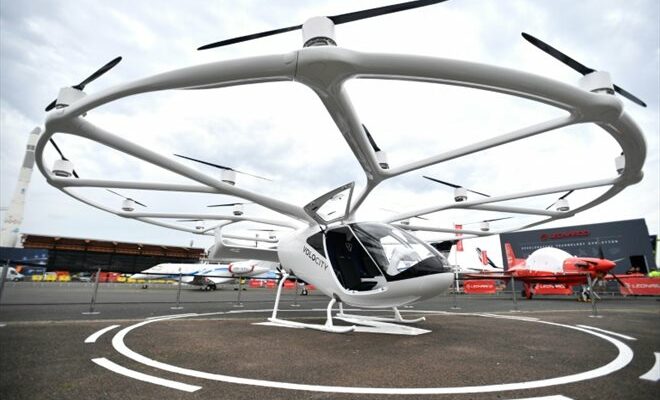(AFP/Anthony WALLACE)
Fly over Paris in complete safety and without noise pollution: despite the hostility of Parisian elected officials, the German company Volocopter intends to take advantage of the showcase offered by the Olympic Games and fly for two years in the French capital to convince the interest of flying taxis.
“Noise, safety and durability are the most important criteria for flying over a city,” explains its boss Dirk Hoke, in an interview with AFP.
And with the strict regulations governing air traffic above the French capital, “if you can fly to Paris, you can fly to any city in the world,” he argues.
Its “VoloCity”, an electric vertical take-off and landing (eVTOL) machine, is a two-seater aircraft that looks like a large insect crowned by 18 rotors. Volocopter intends to make it the first in the world to be certified by EASA and the FAA, the European and American aviation safety agencies.
“The goal is to be certified to fly this summer in Paris,” according to Dirk Hoke. For this, test flights follow one another, documentation accumulates with the aim of demonstrating that the machine has the same level of safety as an airliner, a hundred times higher than that of a helicopter.
Statistically, “that means one accident every one billion flight hours, which exceeds the life cycle of any aircraft,” he recalls.
In collaboration with airport manager Groupe ADP, RATP and the Ile-de-France region, Volocopter intends to fly it on five routes: two tourist loops around Issy-les-Moulineaux and Le Bourget airport, and connections linking Issy-les-Moulineaux to Saint-Cyr-l’Ecole, near Versailles, Le Bourget to Roissy-Charles De Gaulle airport and Issy-les-Moulineaux to a barge on the Seine located near the Austerlitz station in Paris.
Allow around twelve minutes for a 20 kilometer flight.
– “Gain someone’s trust” –
Will the precious sesame be awarded on time? “We don’t know, because we are the first,” he concedes. Failing this, Volocopter can hope to obtain a “special permit” from EASA allowing it to carry out demonstration flights without paying passengers during the Olympics.

(AFP/JULIEN DE ROSA)
But beyond the Olympic showcase, what is important in the eyes of the manager are the two years of experimentation with a handful of VoloCity in Paris which will follow certification. “A learning phase” intended to “demonstrate that these systems are not fiction” in order to “gain the trust of the population”.
At the beginning of September, the French Environmental Authority judged the impact study of the future experimental base for flying taxis planned on the Seine, known as the “vertiport”, to be “incomplete”, calling into question noise and visual pollution.
As part of this environmental assessment, Parisian elected officials had issued a negative – non-binding – opinion to the Paris Council on the Austerlitz vertiport, some denouncing an “absurd” project and an “ecological aberration”.
“We must take this very seriously and answer the questions because, for us, what is very important is not only certification, it is also acceptance by the population,” he pleads, putting However, there are “two thirds of positive opinions” regarding the project.
It is therefore necessary that its eVTOLs be “visible”. In particular to reassure on the delicate issue of noise pollution. Incomparable with the noise of a helicopter according to him, “at 75-100 meters, it is 55 to 60 decibels, the sound of a conversation”.
“We will have all the support when people have seen and heard the thefts and see that it does not disrupt urban life,” hopes Dirk Hoke.
Volocopter concedes the need for 25 to 30 million euros for the two years of Parisian demonstrations, and “200 to 300 million euros” to prepare for the aftermath.
Because the VoloCity with one seat, apart from that of the pilot, cannot be profitable. With the preparation of a new four-seater aircraft for the end of 2026-beginning of 2027, “that’s where the real business case lies”, argues the manager.
As for criticism of the elitist nature of flying taxis, Dirk Hoke recalls that Telsa’s first vehicle was an electric roadster for two people.
“Everyone said, it’s ridiculous, it’s a toy. Fifteen years later, Elon Musk changed everything, we can do the same thing for the aerospace industry.” Dirk Hoke agrees: it has to be accessible but (…) it will happen much faster than people think.”
© 2024 AFP
Did you like this article ? Share it with your friends using the buttons below.




